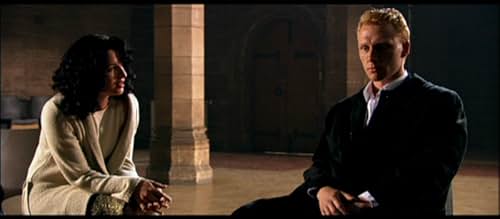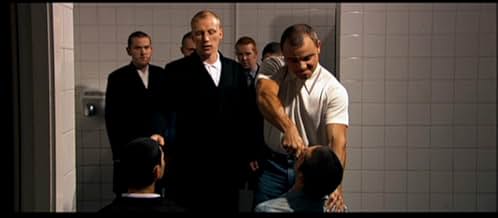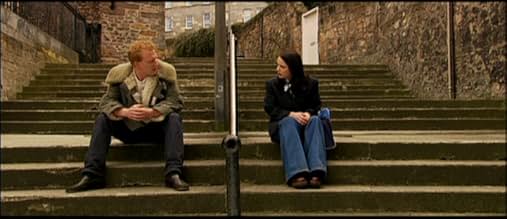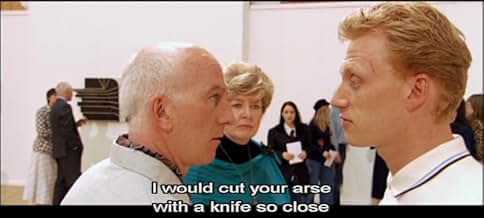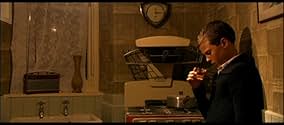IMDb RATING
6.2/10
1.8K
YOUR RATING
16 years of alcohol is about a skinhead named Frankie; his violent childhood, alcoholism and his love for Ska.16 years of alcohol is about a skinhead named Frankie; his violent childhood, alcoholism and his love for Ska.16 years of alcohol is about a skinhead named Frankie; his violent childhood, alcoholism and his love for Ska.
- Awards
- 4 wins & 9 nominations total
Iain De Caestecker
- Frankie - Boy
- (as Iain De Caestaecker)
Lewis Macleod
- Frankie's Father
- (as Lewis MacLeod)
Noof Ousellam
- Rival Gang Boy 1
- (as Naoufal Ousellam)
- Director
- Writer
- All cast & crew
- Production, box office & more at IMDbPro
6.21.7K
1
2
3
4
5
6
7
8
9
10
Featured reviews
Sparse and Barren!
This is a strange morose film. At times it felt like a full length student movie with little in the way of plot development but some interesting themes. It had some interesting points to make on alcoholism but was more a study of the drinking culture of the Scottish working class. The film was held together well by Andewr McKidd who occupies most scenes with some good supporting cast and a cameo from director Richard Jobson. A satisfying film though I am not sure I would want to watch it again. Judge for yourself is my strongest recommendation. All in all this is a good but not great film. Some of what saves the movie are the interesting camera shots and a great soundtrack that I will now definitely be seeking out.
Poetic and Personal Triumph
I was not expecting much from '16 Years of Alcohol'. Perhaps an overly sentimental look back at Scottish urban life, perhaps a neo-realist bleakness. But when it started with hypnotically beautiful images of Edinburgh and a voice-over in that recognisable cadence, with repeating cycles of words drawing out every ounce of meaning from clichés like "hope"... well, I knew that I was firmly in Richard Jobson territory, and that maybe he has always been a film-maker at heart. He skirts cliché while playing with it, trying to show the violence endemic in that society and making many references to other films ('Clockwork Orange', westerns, 'Trainspotting', Martin Scorsese, etc.). It is larger than life and demonstrates how the mythic archetypes shape the characters rather too small for the roles they want to adopt.
Kevin McKidd is brilliant as "Frankie", a character the amalgam of Jobson and his brother; I kept forgetting he was not in fact Jobson. The women are incredibly beautiful and yet have a depth of character not commonly seen in films that make women into such visual feasts. They are saviour archetypes but again somehow avoid cliché. How is Jobson doing this? There is some subtle artistry at work here. The cinematography is gorgeous and I was glad for the snippet of Skids on the soundtrack, though 'Love is the Drug' gets the best treatment in a scene that is both scary and hilarious.
The film is dedicated to Jobson's brother, who did not escape the life of alcohol and violence and was murdered a couple of years ago. In the post-film talk at the Dublin Film Festival, Jobson revealed he had in fact run with the most notoriously violent of Edinburgh's youth gangs, until Skids took him away from that. This is quite obviously a very personal film and yet a highly aestheticised interpretation as well.
I did not want the film to end, and would gladly have sat through it a second time immediately. Maybe it's just where I'm at in my life right now. Maybe it's because I have spent so many hours over the years infiltrated by Jobson's aesthetic. Maybe it's just a damned good film.
'16 Years of Alcohol' won Richard Jobson the award for Directorial Debut at the British Independent Film Awards. It has received glowing reviews from Time Out, The Guardian, and Sight and Sound. It has played at festivals the world over. Forget the dismal comments of those too cynical to enjoy real film-making. See this poetic triumph for yourself.
Kevin McKidd is brilliant as "Frankie", a character the amalgam of Jobson and his brother; I kept forgetting he was not in fact Jobson. The women are incredibly beautiful and yet have a depth of character not commonly seen in films that make women into such visual feasts. They are saviour archetypes but again somehow avoid cliché. How is Jobson doing this? There is some subtle artistry at work here. The cinematography is gorgeous and I was glad for the snippet of Skids on the soundtrack, though 'Love is the Drug' gets the best treatment in a scene that is both scary and hilarious.
The film is dedicated to Jobson's brother, who did not escape the life of alcohol and violence and was murdered a couple of years ago. In the post-film talk at the Dublin Film Festival, Jobson revealed he had in fact run with the most notoriously violent of Edinburgh's youth gangs, until Skids took him away from that. This is quite obviously a very personal film and yet a highly aestheticised interpretation as well.
I did not want the film to end, and would gladly have sat through it a second time immediately. Maybe it's just where I'm at in my life right now. Maybe it's because I have spent so many hours over the years infiltrated by Jobson's aesthetic. Maybe it's just a damned good film.
'16 Years of Alcohol' won Richard Jobson the award for Directorial Debut at the British Independent Film Awards. It has received glowing reviews from Time Out, The Guardian, and Sight and Sound. It has played at festivals the world over. Forget the dismal comments of those too cynical to enjoy real film-making. See this poetic triumph for yourself.
Pretentious drivel
Agreed, pretentious drivel, dull and impossible to care about! To me there were many, many problems with this film - the voiceover is very self-consciously attempting to be poetic but fails, most of the music is very irritating, loutish music for yobs not very popular even when originally released. The acting , Kevin McKidd's portrayal of Frankie is remarkably wooden for an actor that once showed such promise, how far he has fallen in such a short period of time. I suppose he suffered from poor direction, often the problem with a new and inexperienced director and producer afraid to keep his feet on the ground, pretentious aspirations have run riot, an attempt to make a "worthy" film, has unfortunately steered this ship on to the rocks of self indulgence. Agreed the story may be personal and minimal but in my opinion who should or could care about such ugly, cruel youths or their fates. I found my self almost immediately emotionally detached from all the characters though bored indifference. Comparisons to 'Ratcatcher' are truly laughable. Another film by a native of Edinburgh that made the Edinburgh Festival (historically automatic for any film ever made in Edinburgh) that also suffers from being shot on high definition for £450,000, for goodness sake with that amount of money the film could have easily been shot on superior 35mm film which would have made the film look much better rather than the 'Dogma' video looking quality print that I saw in Edinburgh, why do people working on tape always say that it looks so much like 35mm film, when to shoot on film would mean it would automatically look like film instead of automatically demoting the film to DVD/ Video sell through, because when projected the majority of cinema goers including myself hate paying to see washed out grainy, poor quality blown up video images. The direction will not move you I guarantee and as for the production values...who goes to see, rents or buys films for their production values? At the end of the day you pay your money to be entertained or moved and you will fail to receive either from this debut, sadly this film is pretentious drivel, the critics will slaughter it and the investors will loose their shirts, harsh but an economic truth. Yet another British embarrassment on its way to festivals guaranteed to be laughed at, with jaws dropped open in shock, by our American cousins.
Pure cinematic poetry - a must-see
From Kevin McKidd's stunning performance to the exquisitely shot Edinburgh exteriors, this is one of the most beautiful and evocative films I've ever seen. Anyone who grew up in Britain during the 1970s will recognise much of what's up on-screen. McKidd and Jobson have captured the teenage experience of those years perfectly and reproduce the entire register of repressed emotions and violent undercurrents with unswerving accuracy.
Naturally, it's a film about redemption - of sorts - but the tantalising, bitter-sweet promise of love and hope that permeates this film is delivered with a genuine toughness that sets it apart from the usual Brit-flick. File alongside some of the best European imports of recent years ... a wonderful and powerful movie that everyone should see.
Naturally, it's a film about redemption - of sorts - but the tantalising, bitter-sweet promise of love and hope that permeates this film is delivered with a genuine toughness that sets it apart from the usual Brit-flick. File alongside some of the best European imports of recent years ... a wonderful and powerful movie that everyone should see.
Edinburgh drinking man depicted in hard-etched poetry
"Sixteen Years of Alcohol" is the Edinburgh story of a guy with a philandering dad who starts to drink at twelve or so, turns into a violent, alcoholic punker, and finally seeks self-reform. Early scenes depict Frankie, the young boy and his father. We then jump forward to the big, muscular Frankie Mack (Kevin McKidd) terrorizing pubs and shops with his three mates like Alex and his dogies in "A Clockwork Orange" but without Alex's archness and glee. Frankie also gets into fights with his own mates and woos Helen (Laura Fraser), who clerks in a record shop.
Eventually the hero, whose brooding voice-overs constantly intrude, loses Helen, though for a while she seems to have tamed him and turned him from Mars into Artemis, bearer of good news -- as she puts it in a game they play on a colonnade perched high up above the town. Frankie gets stabbed and kicked senseless (S.O.P. for the hoodlums of this piece) and winds up in a twelve-step group for alcoholics -- but when he shares at a meeting, he tellingly substitutes for the classic AA declaration, "My name is Frankie, and I AM A VIOLENT MAN." He also joins an acting workshop with Mary (Susan Lynch), his new girl -- or recovery pal: there's no lovemaking or physical affection shown. One shot hints that Frankie's employed in a workshop or factory, but specific detail is lacking: the film is deliberately short on connected narrative, going for passion and poetry over mundane realism.
There's truth in the 'Village Voice's' thumbnail description of "Sixteen Years of Alcohol" as a series of "static tableaux," and it's also true that McKidd's better than "the dubious romanticism and hard-man clichés of his role." Parts of the movie fall flat, but what makes it worth watching is an intense clarity about the people and the sharply lit scenes they're in. Also welcome to an American is that unlike some Scottish films this one's English is crystal clear too. There is the power and sincerity of the simple small film in "Sixteen Years of Alcohol," but also a lack of narrative focus and sense of a whole world one finds in England's Sixties "angry young man" films beginning with "Saturday Night and Sunday Morning." Jobson isn't trying for "kitchen sink" realism at all, but for something poetic and expressionistic; and the stark, strikingly lit photography helps him approach that goal and make this a watchable film.
What's less appealing is the simplistic fatalism of the plot structure. One may wind up wishing Frankie had received more practical tips about how to stay off alcohol and violence, rather than focusing on his relationships with women, which aren't developed very far anyway. The "dubious romanticism" shows up in the way a life is ultimately seen as circular (as is the film's "ring" framing device) and doomed, rather than -- what would be equally justified by the story -- moderately hopeful. The chap is still young and healthy, after all, and he wants to get better. Why not suggest he's going in that direction? This is the first film for Jobson, previously known as the front man for the Seventies Scottish art punk band, the Skids, and, later as a poet, model, TV presenter, film producer and critic. He has not disgraced himself in this semi-autobiographical effort (the time-line follows that of his own Sixties childhood and Seventies youth). What one remembers are the stark sometimes beautiful images. The high-flown, overwrought writing can be cloying, but may also point in a fresh new direction. No Danny Boyle here, but rather, perhaps, a new style and voice.
(Seen March 26, 2005 at Cinema Village in New York.)
Eventually the hero, whose brooding voice-overs constantly intrude, loses Helen, though for a while she seems to have tamed him and turned him from Mars into Artemis, bearer of good news -- as she puts it in a game they play on a colonnade perched high up above the town. Frankie gets stabbed and kicked senseless (S.O.P. for the hoodlums of this piece) and winds up in a twelve-step group for alcoholics -- but when he shares at a meeting, he tellingly substitutes for the classic AA declaration, "My name is Frankie, and I AM A VIOLENT MAN." He also joins an acting workshop with Mary (Susan Lynch), his new girl -- or recovery pal: there's no lovemaking or physical affection shown. One shot hints that Frankie's employed in a workshop or factory, but specific detail is lacking: the film is deliberately short on connected narrative, going for passion and poetry over mundane realism.
There's truth in the 'Village Voice's' thumbnail description of "Sixteen Years of Alcohol" as a series of "static tableaux," and it's also true that McKidd's better than "the dubious romanticism and hard-man clichés of his role." Parts of the movie fall flat, but what makes it worth watching is an intense clarity about the people and the sharply lit scenes they're in. Also welcome to an American is that unlike some Scottish films this one's English is crystal clear too. There is the power and sincerity of the simple small film in "Sixteen Years of Alcohol," but also a lack of narrative focus and sense of a whole world one finds in England's Sixties "angry young man" films beginning with "Saturday Night and Sunday Morning." Jobson isn't trying for "kitchen sink" realism at all, but for something poetic and expressionistic; and the stark, strikingly lit photography helps him approach that goal and make this a watchable film.
What's less appealing is the simplistic fatalism of the plot structure. One may wind up wishing Frankie had received more practical tips about how to stay off alcohol and violence, rather than focusing on his relationships with women, which aren't developed very far anyway. The "dubious romanticism" shows up in the way a life is ultimately seen as circular (as is the film's "ring" framing device) and doomed, rather than -- what would be equally justified by the story -- moderately hopeful. The chap is still young and healthy, after all, and he wants to get better. Why not suggest he's going in that direction? This is the first film for Jobson, previously known as the front man for the Seventies Scottish art punk band, the Skids, and, later as a poet, model, TV presenter, film producer and critic. He has not disgraced himself in this semi-autobiographical effort (the time-line follows that of his own Sixties childhood and Seventies youth). What one remembers are the stark sometimes beautiful images. The high-flown, overwrought writing can be cloying, but may also point in a fresh new direction. No Danny Boyle here, but rather, perhaps, a new style and voice.
(Seen March 26, 2005 at Cinema Village in New York.)
Did you know
- ConnectionsReferences Enter the Dragon (1973)
- How long is 16 Years of Alcohol?Powered by Alexa
Details
- Release date
- Country of origin
- Language
- Also known as
- Frankie Mac - huliganen
- Filming locations
- Production company
- See more company credits at IMDbPro
Box office
- Gross US & Canada
- $8,046
- Opening weekend US & Canada
- $2,863
- Mar 20, 2005
- Gross worldwide
- $8,046
- Runtime
- 1h 42m(102 min)
- Color
- Sound mix
- Aspect ratio
- 2.35 : 1
Contribute to this page
Suggest an edit or add missing content



